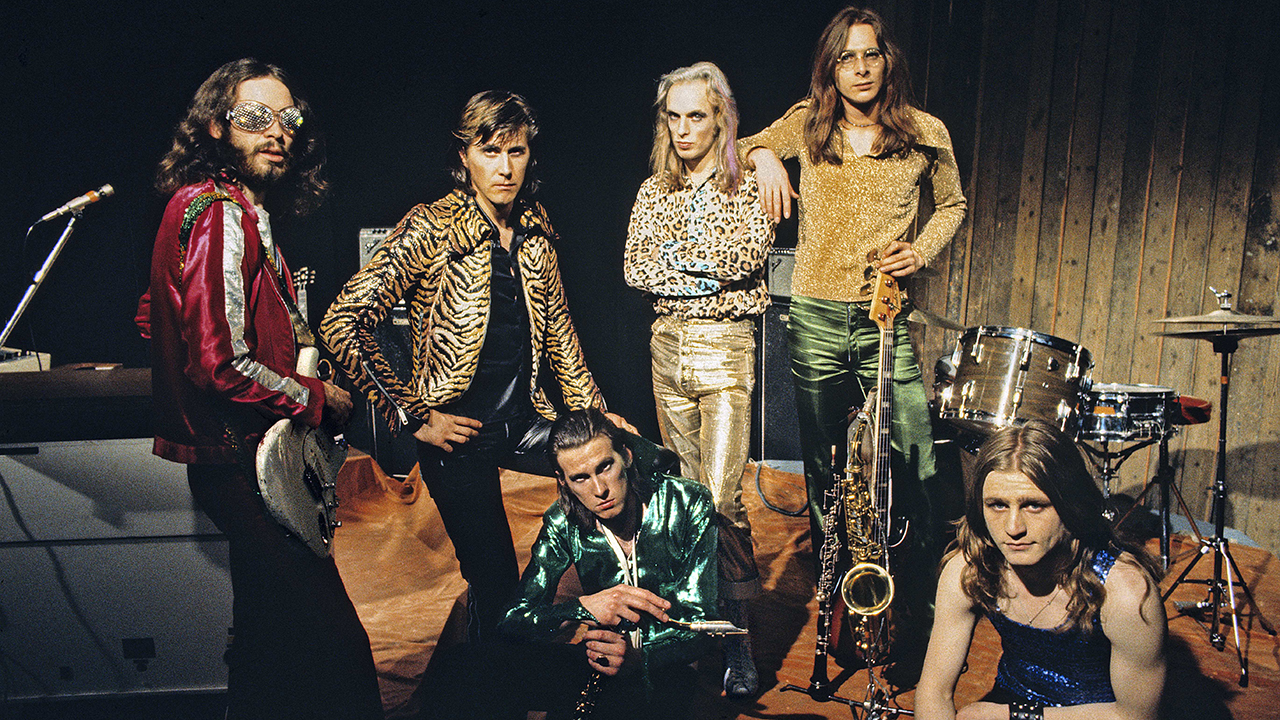“It feels, without sounding pretentious, like we’ve been working our way up to this point since the first album." How Opeth ditched the death metal on 2011's Heritage
In 2011 Swedish prog metallers released their tenth album Heritage, ditching the heavier stuff and going full on prog.
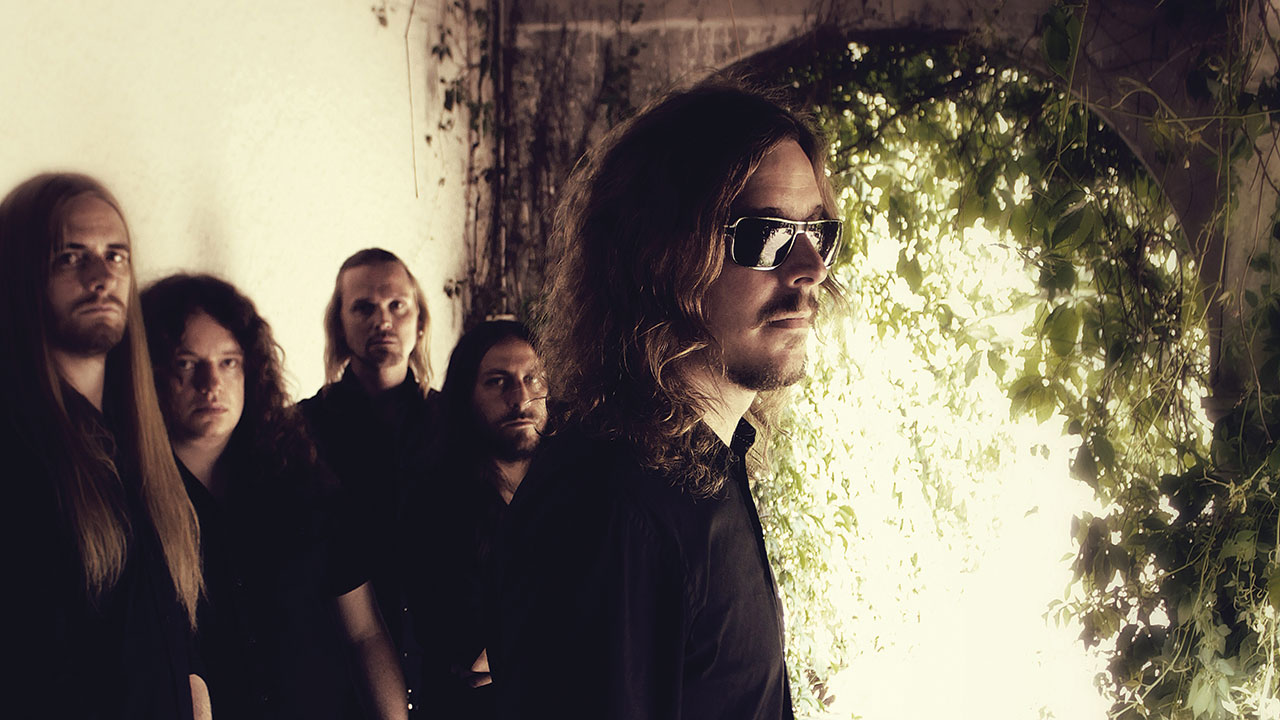
You could say it was inevitable. Album after album the death metal roots from which Opeth sprang and were nurtured slowly and steadily frittered away exposing a beautiful progressive rock blossom. But while the aggressive growls and heavy distortion were still tangible in albums as recent as 2008’s Watershed there were always hints that their follow-up could erase their metallic inclinations. Those hoping for a sign of brutality need just to take one look at the cover of their newest album to accept defeat: Heritage’s artwork is an open invitation to a musical odyssey steeped in prog rock – a bountiful tree rooted from the depths of hell, built around a pastoral landscape nestling a flaming city in the background and a pit of skulls beneath. It’s a mammoth leap from the gothic imagery of yesteryear. Pure and simple, Heritage is Opeth’s proggiest album to date. Mankind might feel the tremors, but the leap is but a small step for frontman Mikael Åkerfeldt and his band.
“It feels, without sounding pretentious, like we’ve been working our way up to this point since the first album,” explains Åkerfeldt. “I did start writing stuff that sounded like a continuation of the last album but I was kind of fooling myself. I had two songs and I ended up deleting them after our bass player [Martin Mendez] said ‘Man, that’s not good’. He was on the same wavelength as I was pretty much, I just needed a second opinion to get a kick up the ass. So I scrapped everything and started from scratch and did a song called The Lines In My Hand which was the first one I wrote for Heritage. And then I wrote the rest of the stuff in six or seven months and it was easy. I didn’t stop and think, I just wrote it.”
Let this be warning to any fan of Opeth’s metallic edge, Heritage is almost completely void of metal. Gone are the demonic growls and, perhaps more surprisingly, the distorted guitar riffs and drum machine-style pedal action that leant itself to the Swedish death metal genre out of which Opeth was born. Clearly a brave step for a band that have been deemed ‘heavy’ for 20 years, but possibly one that’s detrimental to their metal fanbase.
“You can’t worry about those kinds of things,” Åkerfeldt shrugs confidently. “I think that some fans will be disappointed with this not being a regular Opeth album but we’ve done experiments in the past. If you know your Opeth history then this isn’t an outrageous album at all.”
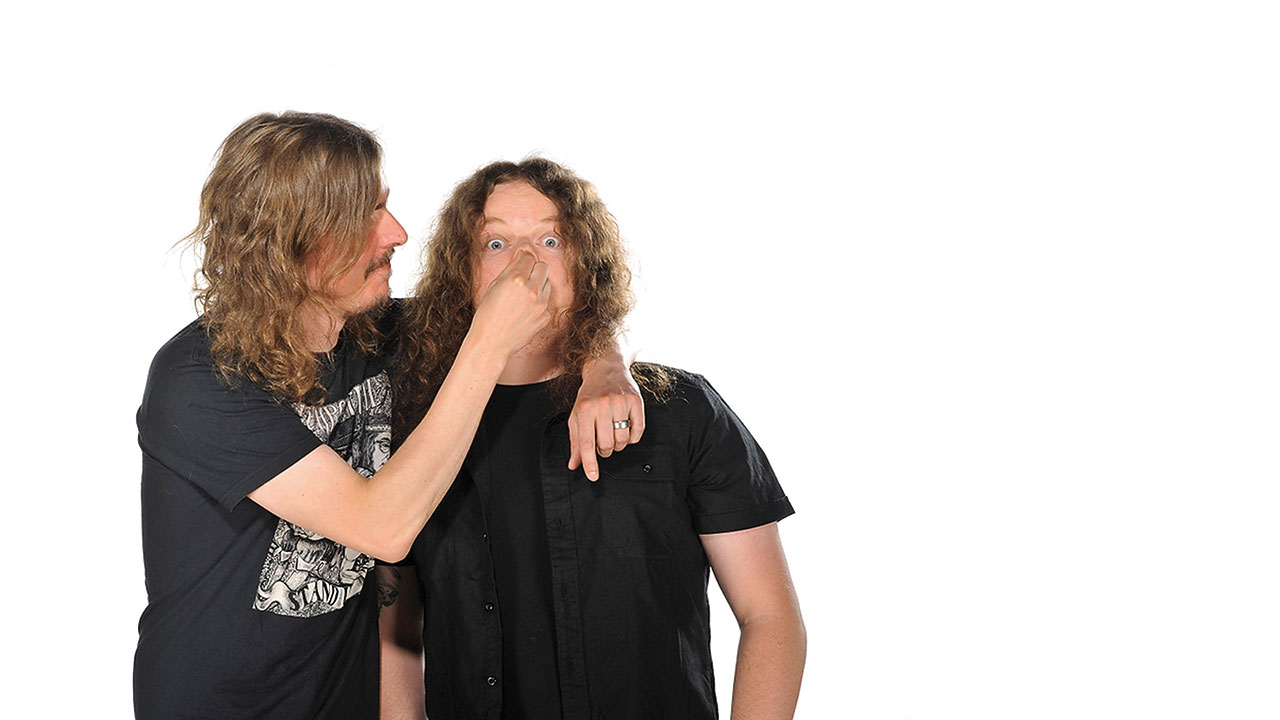
It’s all well and good for Åkerfeldt. As the frontman of Opeth he essentially calls the shots, but there are five men in this merry band of brothers and one member who is sure to have words about the evaporation of their heaviness is guitarist Fredrik Åkesson. For the sake of inner harmony, it’s a relief that he’s in accordance with Åkerfeldt’s choice:
“When I heard about the album I hadn’t heard any of the songs at that point. But I knew that there wasn’t going to be any growls and there would be less distortion on the guitars and bass. And the metalhead in me was like ‘Are you really sure about that?’ but when I came to his house and heard the stuff I was like ‘Yeah, that’s a really cool vision!”
By shifting the focus from brutality to prog-drenched experimentation Heritage has opened up a new world both to fans and to the musicians who play on the record. Without the oppressive effect of guitar distortion, there’s leeway for other members of the band to shine, and none more so than their drummer, Martin Axenrot.
Sign up below to get the latest from Prog, plus exclusive special offers, direct to your inbox!
“This time round everyone has their own space, especially the drummer because he’s been aching to do an album like this forever,” says Åkerfeldt. “He’s only been known for his metal drumming but he actually started out in a marching band and his drumming idol is Ian Paice and he’s never really had enough credit. So he’s all over this album doing rock drumming, fusion drumming, jazz and heavy metal. So it’s great that every musician is there.”
Joining Opeth on Heritage are two notable guest musicians, namely Peruvian-born percussionist Alex Acuña (from Weather Report) and flautist Bjorn J:son Lindh, who has worked with, among others, Mike Oldfield.
“Alex was a bit of a coincidence,” says Åkesson. “A guy who was helping us out with the drums knew that we needed help with this percussion part and also knew that Alex was in town for a drum clinic at a jazz fusion club, so he told us about it. And Alex is like, only the best percussion player in the world, so it was perfect!”
Lindh wasn’t quite such an easy coup as the band had tried, and failed, several times to get Lindh to play flute on the record, but as he was in Stockholm during the time of recording he agreed to pop by and lay down his sound. Or as Åkesson puts it, “did two takes then pissed off.”
Perhaps unsurprisingly Lindh wasn’t the only famous flute player that Opeth had in mind for the record, as Åkerfeldt explains:
“I did email Ian Anderson but I never heard back from him. Funnily enough when I went down to Steven’s [Wilson] place to mix the album we’re sitting on his couch and he says ‘Oh, I just got an email from Ian Anderson’ and I was like ‘What?!’ And he just said ‘He just wants me to look into mixing Aqualung’. I’m really happy in retrospect that we have Bjorn because it fits with the vibe of the record.”
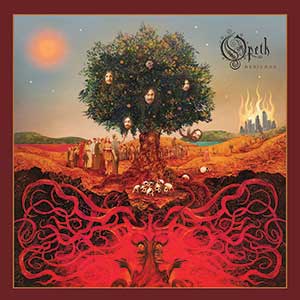
But there’s one musician who will not be revelling in the glee afforded by Opeth’s newest endeavour. Earlier this year it was announced that long-standing keyboardist Per Wiberg was leaving the band, the reasons for which will never be clear, not even to the band. While Åkesson recalls the day that Wiberg said he’d “lost the joy of playing music”, Åkerfeldt can’t help but feel there was something more personal involved: “Because I’m the leader of the band, or whatever, I don’t think he felt comfortable with me having the final say on things. In fact, sometimes I felt like he despised me. My intuition told me that because he was calling up the other guys and going out to bars with them but he never called me. And we used to be really good friends.”
Nevertheless, animosity doesn’t make the actual task of firing someone any easier. Åkerfeldt recalls the day he took the plunge and gave his dispirited keyboardist his marching orders:
“So I fired him and got terrible panic attacks after that. I was doing it through email because I was bitter and angry. Then we started emailing back and forth and he hadn’t said more heartfelt stuff than he did in those emails. So I asked him ‘Would you have left anyway?’ and he said ‘Yes’. That made me feel a lot better.”
To this day Åkerfeldt will never really understand the source of Wiberg’s acrimony but in the meantime he can rest assured that key duties are in safe hands courtesy of their replacement, ex-Yngwie Malmsteen keyboardist Joakim Svalberg. Although not necessarily a permanent fixture (Åkerfeldt prefers to “take things slow” with Svalberg) the new recruit is already proving a hit, and anyone in attendance at Opeth’s recent gigs should be able to testify his pristine vocal contribution, which is surely a bonus.
“Our voices fit together better than Per’s. But then Joakim’s very professional in that sense, he’s not going to do anything half-arsed. He’s so prepared. He knows all the lyrics – even I forget the lyrics – all the harmonies, and he’s really into it.”
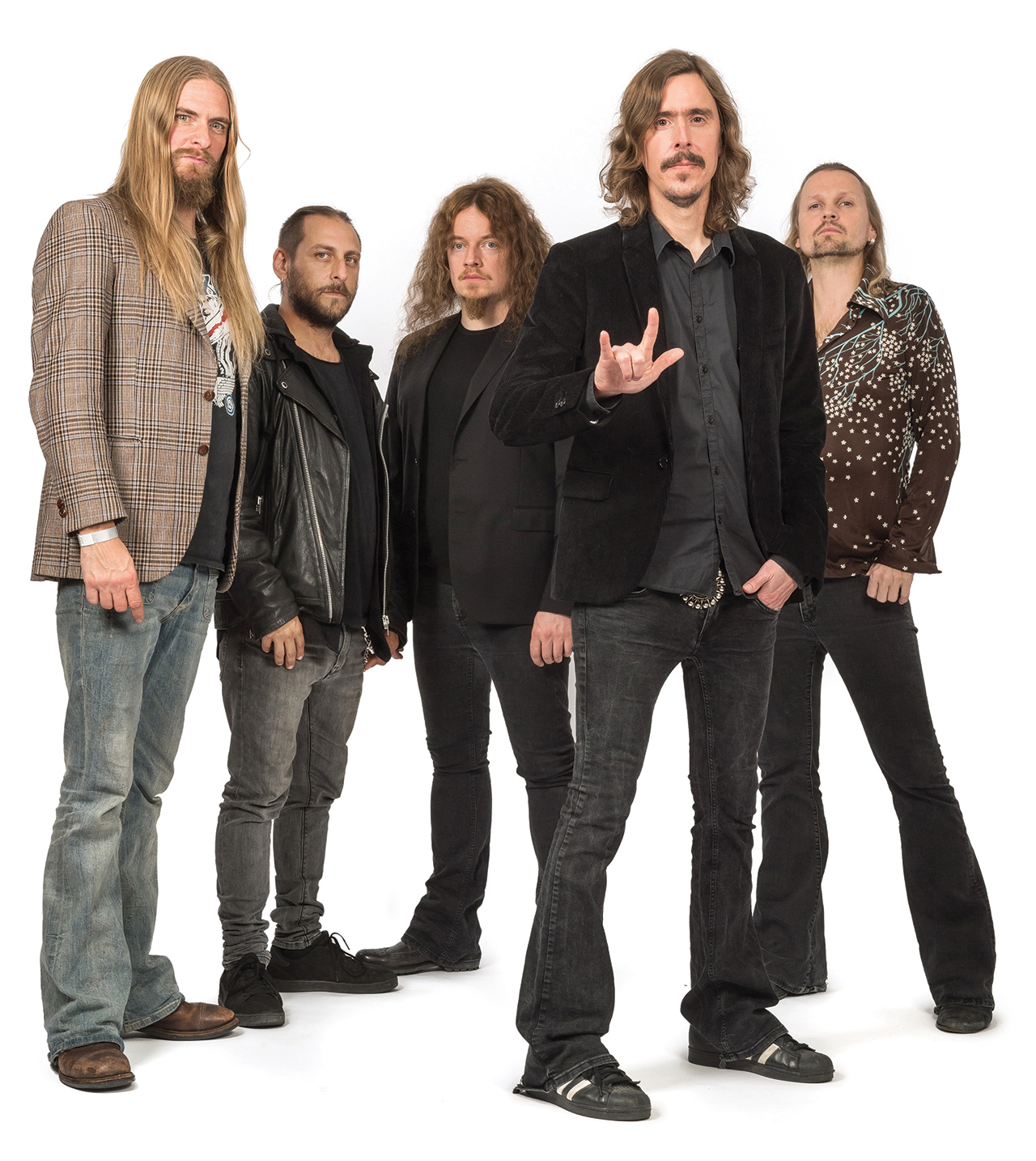
Åkerfeldt might be taking it slow with Svalberg but he’s certainly making the most of the pianist’s prowess. The opening bars of Heritage are a sparse and delicate piano piece more befitting a woeful interlude than an album’s introduction. But like the record’s cover art, it serves as a blatant indicator that Opeth are doing something different this time. Indeed Heritage is more than just a ‘less metal’ version of the Opeth we are used to; sift through the tracks and there you will find cheeky folk ditties, vocoder vocal passages, ominous tribal drums and numerous peaceful moments conveying menace in equal measure, but in an entirely different mode, to the doom of Opeth’s heavier past. Any fan of prog will grasp the concept of expressing depth without the need for heaviness and indeed, those moments have always been sewn into the framework of Opeth’s back catalogue. Even without the aggression the Swedes have always managed to achieve a sense of foreboding by use of haunting vocals and minor keys.
“I’ve never been a big fan of happy, uplifting music. But with that said I think that sorrowful music can be uplifting,” muses Åkerfeldt. “I don’t want to go and slit my wrists just because of a song, but that’s the style that I like. With the production of this album it was easy to bring those things forward musically. If you do the metal thing, the few emotions that are in there come from aggression, so this time it was just easier to tap into those profound feelings.”
Given that Heritage sounds like an acid trip, you’d be forgiven for thinking that its creator has dabbled in psychedelics but Åkerfeldt openly admits that he hasn’t, and will never, “touch the stuff”. But with a library of influences that hark back to the 70s he is more than aware that his influencers were probably “out of their heads on something” when they made the records that have shaped Heritage.
Talking to Åkerfeldt about his thoughts on the state of the current music scene it’s evident that he feels uninspired by today’s metal offerings.
“I think we’re the biggest metal fans ever and that’s why we allow ourselves to get a bit fed up and pissed off with the contemporary metal scene. It doesn’t really offer me anything as it is right now. I take all my inspiration from older bands.”
This might be why Heritage is their least metal album to date, but listen to any Opeth album and the presence of other influences is clear, and is also the reason why Heritage contains a plethora of musical tangents. Åkerfeldt describes his musical interests as covering metal as well as jazz and folk, but he can also attribute his influences to a man that has proved integral in Åkerfeldt’s professional and personal life.
“Steven Wilson played me an album by David Crosby that I hadn’t heard – it was his first solo album If I Could Only Remember My Name – and it blew my mind. It’s just a jamming kind of record but it’s got the crème de la crème of the West Coast scene. It’s just a beautiful record,” he enthuses. “When it comes to metal I listen to stuff that moves me and strangely it’s stuff I’ve listened to my whole life. Recently I went for what I like to call ‘an old man’s walk’ where I just go out walking and listen to music and I was listening Rainbow Rising and my eyes were tearing up. I was like ‘how is this possible? I’ve heard this a million times’. Now it means more to me than ever, so it’s those types of records – Rainbow Rising, Judas Priest Sin After Sin – I listen to a lot.”
There’s no shadow of a doubt that Opeth will continue to reinvent their wheel at every turn and that is surely the beauty of this beast, that you never really know what’s coming next.
“A lot of people, once they have a career, get afraid of their own creativity. They think they’re going to lose their jobs if they get creative. But I think our career is based on doing what we want, because that’s what we’ve always done.”
This article originally appeared in issue 19 of Prog Magazine.
With over 10 years’ experience writing for Metal Hammer and Prog, Holly has reviewed and interviewed a wealth of progressively-inclined noise mongers from around the world. A fearless voyager to the far sides of metal Holly loves nothing more than to check out London’s gig scene, from power to folk and a lot in between. When she’s not rocking out Holly enjoys being a mum to her daughter Violet and working as a high-flying marketer in the Big Smoke.

